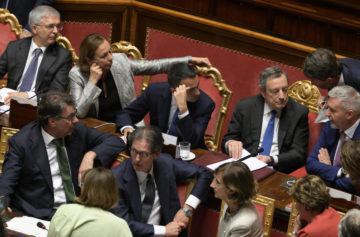
Lucio Baccaro in Phenomenal World:
On September 25, Italians will be called to elect a new Parliament. The snap election follows on the heels of the collapse of the government in late July and the resignation of former European Central Bank (ECB) President Mario Draghi. That the country would dismiss such an esteemed prime minister and hold early elections—while it remains lashed by the interconnected crises of Covid-19, the rise in energy prices, and an impending recession—has been a cause of consternation and confusion for many in the international press.
From the outside, Italian politics appears mystifying and convoluted. In reality, it is quite predictable: Patterns that occurred in previous decades reemerge and repeat themselves in a cyclical manner. For the past thirty years, Italy’s perpetual state of emergency has periodically necessitated the formation of expert-led national-emergency governments. In subsequent elections, disappointed voters shift their allegiance to individuals and organizations that can credibly present themselves as an alternative to the status quo. All the while, a new existential threat on the horizon compels the remaining “responsible” forces to empower a new cohort of technocrats.
Marx warned that history repeats itself—first as tragedy, then as farce—but he never elaborated what might come next. Perhaps more germane to the Italian situation is a paraphrase of Nietzsche: Italian politics is the eternal return of the same.
More here.
